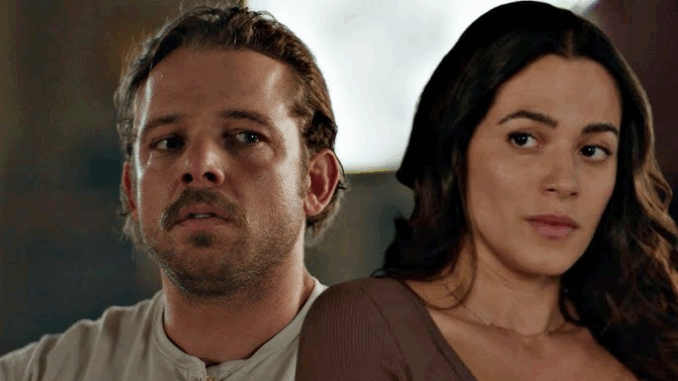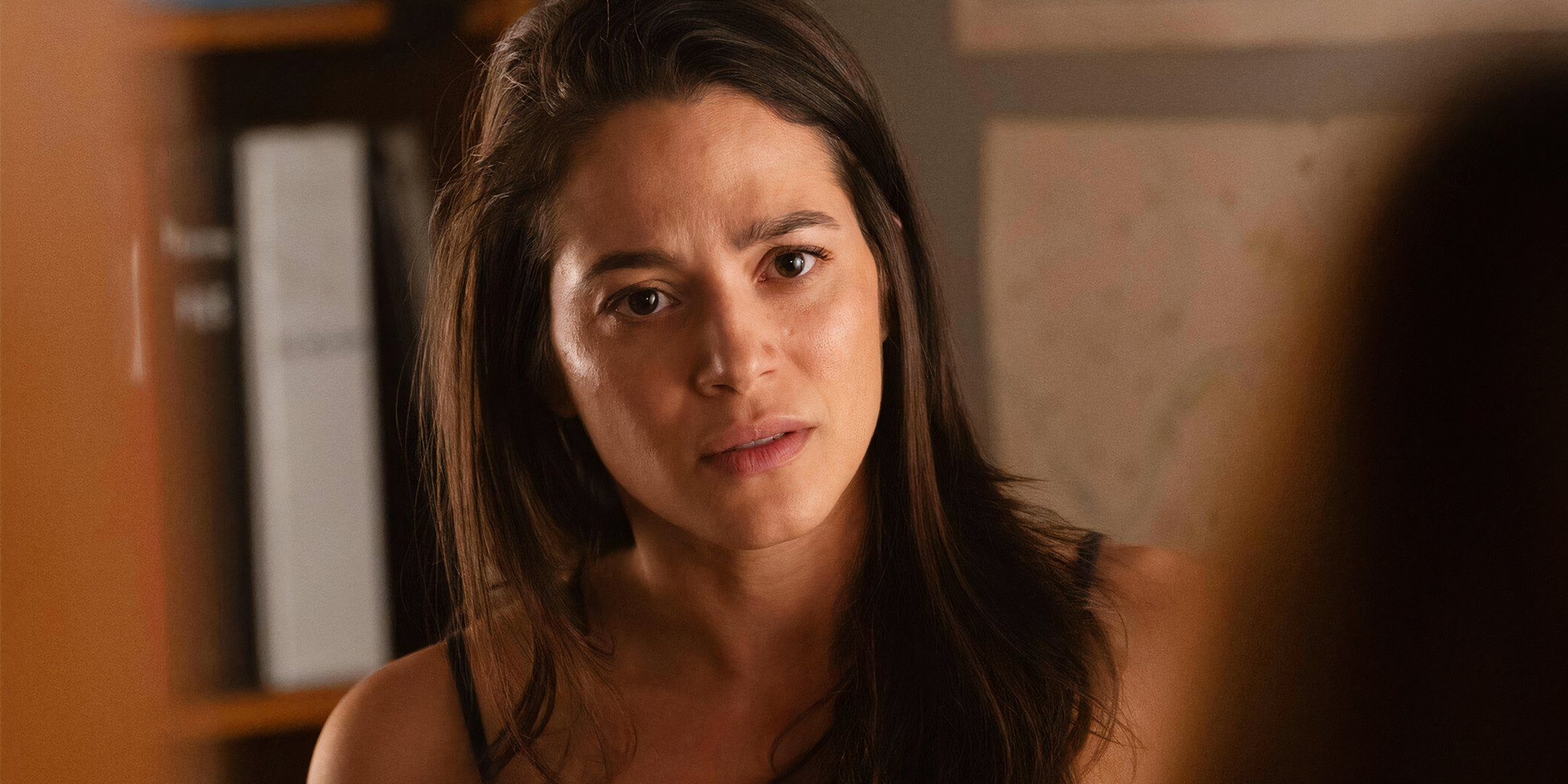
The Woman Who Carried Fire and Fragility
From the moment she appeared in Fire Country, Gabriela Perez was a character defined by duality. She was a firefighter with sharp instincts, a paramedic who worked under pressure, and an athlete who lived for physical challenge. But she was also deeply emotional, vulnerable, and searching—for connection, for healing, and for a future she could believe in.
Her relationship with Bode Donovan quickly became the emotional backbone of the series. It wasn’t just about romance—it was about redemption, pain, second chances, and the complexity of rebuilding trust with someone whose past threatens to swallow them whole.
That’s why Gabriela’s decision to walk away in Season 3 wasn’t just another dramatic twist—it was a spiritual rupture for the show.
A Journey Through Trauma
By the time she left Edgewater, Gabriela had endured more than most characters in the series. After surviving a helicopter crash on her wedding day, confronting the terror of a stalker who nearly killed her, and watching her father Manny fall from grace and claw his way back—Gabriela was no longer the young, hopeful woman we met in Season 1.
Her departure wasn’t driven by a singular event. It was the cumulative result of untreated trauma, emotional burnout, and the quiet realization that survival sometimes means walking away.
“I don’t feel safe here anymore,” she tells Bode in one of their final conversations. Not because he is a threat, but because everything around him reminds her of what she’s lost, and how much she’s had to carry.
Leaving Bode: A Heartbreaking Necessity
Perhaps the most painful part of Gabriela’s exit was that it wasn’t about love lost—it was about love not being enough.
Her connection with Bode was raw, deep, and hard-earned. They shared a childhood, a lifetime of guilt, and an adult love that blossomed amidst chaos. But love cannot be oxygen. And for Gabriela, being with Bode began to feel like suffocation. Not because of his actions, but because of the weight that history placed on them both.
Bode had become her tether, but also her burden. Every time he fell, she tried to carry him. Every time he pushed back, she tried to pull him forward. Eventually, she broke under the weight.
When she leaves, it’s not with bitterness—but with resignation. She walks away from Bode with tears, not anger. Because in her heart, she knows she’s not running from him—she’s running toward herself.
The Psychological Realism of Her Departure

Fire Country made a bold decision in portraying Gabriela’s exit not as a betrayal or disappearance, but as a psychologically grounded character decision. So often in drama, women are either killed off or written out in sudden, melodramatic ways. Gabriela’s arc was different.
She reached her breaking point and made a choice rooted in agency and self-preservation. It was quiet. Painful. Human. And it resonates deeply because it mirrors real-life trauma recovery: sometimes, healing requires distance—even from those we love the most.
What Gabriela’s Absence Means for Season 4
With Gabriela gone, Fire Country loses more than a love interest. It loses a stabilizing force. Gabriela was the moral and emotional counterbalance to Bode’s fire. She grounded him. Without her, he becomes vulnerable to the darker parts of himself—impulsiveness, guilt, and emotional withdrawal.
Season 4 will likely explore a Bode Donovan untethered. Will he spiral into reckless behavior? Or will he finally learn to stand on his own, forging identity without external validation?
There’s also the impact on Manny Perez, Gabriela’s father. He’s already been on a redemption arc of his own. Gabriela’s departure might reignite his shame, or it may motivate him to become the kind of leader—and father—he once failed to be.
Station 42 will feel her absence in subtle, emotional ways. Gabriela was someone who bridged people—between inmates and Cal Fire, between family and duty. Her leaving could deepen fractures just as the department is reeling from Vince’s death.
Could Gabriela Return?
The door has not been closed.
Writers have left her storyline open-ended, and actress Stephanie Arcila has spoken about the emotional depth of the character, not hinting at permanent departure. Gabriela didn’t leave Edgewater in flames—she left to breathe.
If she returns, it should not be as a romantic reunion right away. It should be as a renewed person—someone who has undergone deep internal work and can re-enter the narrative not as a symbol of Bode’s hope, but as her own independent character.
A return could be incredibly powerful, especially if timed with Bode’s growth. Seeing them cross paths again, changed by time and absence, would give the show an emotional arc few procedurals dare to tackle.
The Risk of Replacing Her Too Soon
There is one potential misstep Fire Country must avoid: replacing Gabriela too quickly. Introducing a new love interest for Bode early in Season 4 would feel disrespectful—not just to the relationship they shared, but to the emotional work the writers built over three seasons.
Letting Bode grieve, reflect, and re-learn who he is without Gabriela will give the story its emotional power. A rushed new romance would only cheapen what came before.
Instead, the writers have an opportunity to deepen Bode’s emotional evolution—perhaps by focusing more on his friendships (like with Eve), his leadership, or even by seeing him mentor a new Three Rock recruit who reminds him of who he used to be.
What Gabriela Leaves Behind
Though Gabriela may be gone, her impact remains. She changed Bode. She challenged Sharon. She forced Manny to confront himself. And she gave the audience a portrait of a woman struggling to remain whole in a world constantly demanding sacrifice.
Gabriela was not perfect. But she was real. And her absence is not just a loss—it is a lingering presence.
In many ways, she’s now like the fire itself: she passed through, changed everything, and left behind something scorched, but perhaps, in time, stronger.
Conclusion: A Departure That Says More Than Words Ever Could
Gabriela Perez didn’t leave in a blaze of melodrama. She walked away with quiet sadness and unbearable clarity. Her journey wasn’t just about trauma—it was about choosing herself after a lifetime of choosing others.
And that is what will echo most through Season 4.
Not the question, “Will she come back?”
But the harder one:
“Who is everyone without her?”
